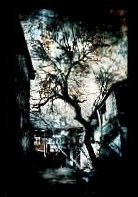|
Horatio
Morpurgo
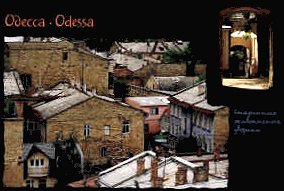
The ship's cook on the night-train south was going home
after four months at sea with an enormous maroon suitcase
full of presents. The owners of a German freighter paid him
$200 a week to feed its crew of Ukrainians, Poles and Filipinos.
He'd worked all over the world but this ship just sailed
back and forth between Lisbon and Rotterdam. I detected a
flicker of defiance as he touched on the subject of his earnings
- he could tell I knew how little that was. But he was
on his way home now, to where $200 a week is a fair wage,
and it was his family he wanted to tell me about too: how
they would be waiting for him at the station in Odessa -
his wife, his children and friends. He recommended Ukrainian
wives: They are the best. English women only so-so.
Ukrainian women Number One. Not sex only - sex is easy.
But culture. Service. Smile.
He snored rather heavily.
We pulled into Odessa next morning at five, a Sunday, the
train mostly empty. There at the end of the platform stood
the excitable gathering which awaited my companion. We said
goodbye and I watched them struggling with his luggage, his
loot, as together they conveyed it to a waiting car. Other
passengers got into taxis which drove off.
The half dozen women cleaning the square paid no attention
to the early arrivals from Kiev. Illuminated by the glow of
the station, wrapped up very warm this December morning, they
concentrated, swept at cobbles with brooms made from bundles
of twigs. Muffled in floral print headscarves, half-hidden
faces bent to the task of clearing up litter and leaves, of
restoring this place to itself while yesterday's crowd,
with all its applause and whistles, its chants and attendant
TV crews, slept - dreaming perhaps of a better tomorrow.
This was December 2004 and I had spent the last ten days exploring
all the excitement in Kiev, which I had stumbled upon quite
fortuitously. In boarding that train to Odessa I was in fact
reverting to the original purpose of my visit to Ukraine,
which had had nothing to do with revolutions, orange or any
other kind. The original purpose had been to write about the
Danube Delta, most of which is in Romania but a small part
of which is Ukrainian territory, currently threatened by the
construction of a channel for ocean-going vessels.
I was left with only a week for this now, after being caught
up in the political commotion in the capital. That tent city
on Kreschatik and the crowds on Maidan had been thrilling
of course, beautiful, even, especially at the start. The protests
at Russian-backed election-fixing had seemed as much a spiritual
achievement as one of logistics and physical endurance. I
didn't care as much as so many of my fellow-journalists
did about the obvious American involvement. What bothered
me, ten days in - though this may have been the same misgiving
just differently experienced - was that it seemed to
be less and less about students talking fairness and history
and poetry. More and more it was commentators talking ‘nation-birth'
and ‘the path to Europe', meaning the EU. It was
snow turning to slush. The branding, the endless repetition
of slogans, the theme tunes and drinking songs penned spontaneously
for the occasion, playing on a loop from speakers fixed to
every lamp-post in the city centre… There was only so
much of this I could take, in even the best cause.
By now I couldn't remember why I'd packed Virginia
Woolf's Mrs Dalloway but I was delighted to discover
it at the bottom of my case, rummaging after an elusive last
pair of clean dry socks. I could feel that the hours and hours
spent outdoors in that stinging cold, plus the emotional exhaustion,
were about to result in flu. I decided to stay in with a packet
of paracetamol and this novel I should have read years ago,
following today's developments, like the rest of the
world, on TV.
So I began to read. A society hostess and her party, her wealthy
guests - a world of pre-war assumptions and securities-
what help could this be, you might ask, eighty years on, in
a post-modern revolution chanced upon in a country of which
I knew almost nothing? But those assumptions and securities
are seen, refracted through the author's gaze, at the
very moment of their dissolution. In Woolf's prose the
overweening imperatives of the outer world meet the vagaries
of the inner one and the two continuously merge or separate,
attract then repel, undermine then compliment one another.
And this felt like just the intellectual First Aid I needed.
It was both oblique commentary on, and counterpoint to, the
situation outside which was trying to give me flu. Nothing
more mysterious than that way the right book comes to hand
at the right moment.
Here was Peter Walsh, for example, deciding to attend his
old flame's party:
| For
this is the truth about our soul, he thought, our self,
who fish-like inhabits deep seas and plies among obscurities
threading her way between the boles of giant weeds, over
sun-flickered spaces and on and on into gloom, cold, deep,
inscrutable; suddenly she shoots to the surface and sports
on the wind-wrinkled waves; that is, has a positive need
to brush, scrape, kindle herself, gossiping. What did
the Government mean - Richard Dalloway would know
- to do about India? |
This
seemed to me neither litterateur-ish nor evasive, as it might
have at another time, but rather a profound and proper qualification
of our inextinguishable need to be ‘doing about India'.
The flu came to nothing and so it was with Woolf's poetry
still ringing softly in my ears that I listened to bunched
twigs being drawn across the cobbles outside Odessa railway
station. Like the square outside Kiev's, this one had
hosted a political rally the previous day but here in this
quiet was some remedy perhaps for all that media-driven stridency
now playing to a captivated global audience.
Seeing no hotel, and having slept badly, I approached one
of the women and in my stumblingest Slavonic pidgin asked
after one. Looking up perplexed but smilingly attentive, she
listened, propped her broom against a traffic bollard, called
something to one of her colleagues who stopped work a moment
to watch me being led away. A short woman, shapeless from
the many layers of clothing in which she was wrapped, my guide
chattered confidingly about, I think, how she had never learnt
any English and how much she regretted it, but I could well
be projecting there. In an empty street we came to a corner
from which a hotel sign was visible half way along. She pointed
it out, took an elated and elaborate farewell and turned back
toward the station.
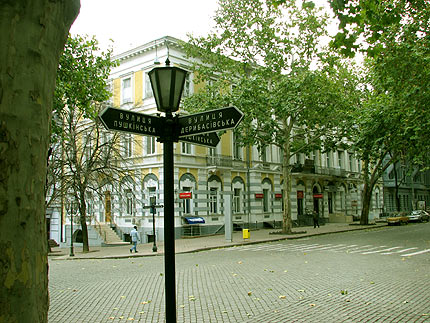
The natural camaraderie of people up early, intensified by
dramatic circumstances, or perhaps just a generous temperament.
I found a church open some way down the street with a few
worshippers already moving silently between the icons or just
waiting, as if for a service to begin. On a wall bench at
the back I sat facing the golden iconostasis and felt intensely
how happy was my escape from the Big Story. The hush in here,
the expectancy, the welcome just extended to me and the newness
of this famous city: was I just giddy with exhaustion or might
I learn more here than even the most spectacular ‘news'
can teach?
I slept in till midday at the hotel. It was only $30 a night
but boasted nattily dressed attendants who glowered aggressively
at you if you didn't seem quite up to its four-star rating.
My clothes badly needed washing by then and my emergence,
bleary-eyed, around lunch-time may also have impressed them
unfavourably. I put it down to the heightened status-anxiety
of hotels that have seen better days.
Or was it something else? What was strangest to me about the
place were all the Americans. The foyer, restaurant and bar
all teemed with them, all male, all middle-aged, their dress
uniformly ‘smart casual' - jeans and jerseys and
jackets. All waiting for something. One of them sported a
black ten gallon hat and swaggered embarrassingly about. You
didn't have to be American to be embarrassed by him.
What's more he had a sort of following and I saw them
later, on my wanderings about the city. A business convention,
perhaps - but why here? And why now? And why smart casual
in that case? Or was that just the dress-code you would expect
for a little relaxed networking? But why no women, then? Or
if the Americans were so obviously involved in Kiev, was this
their advance guard here?
I didn't want to know - I mean I did - I mean I
both did and didn't. There was a small office situated
between the lift and my room, in which a woman sat at a computer
terminal. The door of this room usually stood ajar and the
Americans came and went from it. This must be some administrative
centre for the conference, I assumed. But I had come here
for a breather from Breaking News. My prying journalistic
antennae were (albeit imperfectly) switched off: I've
an uneasy relationship with those antennae at the best of
times - after ten days of interviewing and ‘noticing'
and miscellaneously ferreting around I most certainly did
not feel like switching them back on now.
The main office of an environmental group I needed to contact
was here in Odessa and it was while trying to locate it that
I met an elderly couple that afternoon out for a quiet stroll.
When the husband proved anxious to practise his French and
invited me to supper that evening, I gladly accepted. Now
a retired academic, he had taught Physics in universities
all over the Soviet Union and in French-speaking Africa. It
was suggested that I might stay with them - save on the price
of a room and help polish the English version of a scientific
paper which his son had written. I gladly brought my luggage
round the following morning.
The Influence of Injection-level of Charge-Carriers
in Nano-Structured Porous Silicon on Electroluminescence Quantum
Efficiency....that was just the title. I duly set
about rendering ‘intelligible' eight pages of a
paper I wasn't at all sure I would have understood in
even the most crystalline English prose. But that in itself,
the ‘terms and conditions' of my presence here,
the cramped rooms, the atmosphere of domestic frustrations,
all of it had just the messiness, the uneasy quid pro quo
of home. I'd had enough of handing money to stony-faced
strangers, entrenched behind their reception desks of polished
granite, in return for a room key and the void.
It was genuine, too, the hospitality. Feeling guilty about
eating up their food I went shopping on the Monday and bought
some groceries: the reaction was initially border-line offended,
though they accepted them. Andrey and family lived in one
of the lovely ramshackle courtyards which you glimpse through
openings in the street-fronts of the old town. I did my best
with his son's scientific paper and Andrey took me for
walks, explaining the place desultorily as we went. Medals
issued for the defence of Stalingrad and Moscow were being
peddled to tourists at the top of the Potemkin Steps. A stallholder
offered them to us at $1 apiece and Andrey gently reproved
him - it was the history that interested him, not the
objects, he said, moving on. Passing a ‘blue' (i.e.
Russian Bloc) political rally, its priest intoning prayers
to the faithful out of the back of an open truck painted military
green, Andrey rolled his eyes, exasperated. He didn't
like the new separation from Russia, he told me, but he didn't
for a moment trust the motives or the methods of those aiming
to ‘restore ties'.
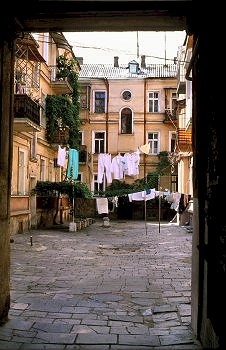
He quietly philosophised or fell into long silences as we
wandered the city's highly rational street-plan. Odessa
was an 18th century idea, suggested to Catherine the Great
by a Frenchman whose statue now overlooks the giant hotel-casino
down by the ferry terminal. It was named after an ancient
Greek colony further down the Black Sea coast - its name
- Odessos - suitably feminised in honour of the Russian
Empress, the new city's patroness. Perhaps that's
why its centre both does and does not feel like an ‘Old
Town' - its regular grid is almost like that of
an American city, and yet the streets which meet at such perfect
right-angles are tree-lined and cobbled and the facades which
give onto them are elaborately stuccoed. On both sides of
the roads dusty old cars were parked everywhere bumper to
bumper under bare winter branches.
With his grey stubble, threadbare shirt-collars and shuffling
steps, Andrey might have been some allegorical figure out
of an old etching: Reason Cast into Dejection, perhaps, or
some character out of an updated Chekhov drama. How dull life
seemed now - no chance of travelling or working, so little
contact with foreigners and the city's Jews all gone
to America or Israel. You never realise, he said, how life
is going to start slipping by in middle age, until suddenly
you are staring old age in the face.
He had been a Communist before but he was of no party now.
He spoke of Yushchenko, the pro-western ‘orange'
candidate, as ‘our president', then produced a length
of the orange plastic ribbon from somewhere, which he danced
with and waved about in the kitchen, then proceeded to tie
round the neck of his dog before taking it out for a walk.
Decypher that if you can - I could not - but I thought
I dimly recognised the feeling all the same. I laughed but
he gave no sign as to whether my interpretation of this as
comedy was correct.
He dutifully showed me the statues and sites: that detached
ambling gait of his accompanied me to the four Frans Hals
portraits in the Art Museum, one for each Evangelist, to the
Greek antiquities in the History Museum. He even showed me
the hotel he'd been married in. But it was the silent
Andrey of the long avenues, mild reprover of the peddlers
in Soviet memorabilia at the Potemkin Steps [pictured
below], Chekhovian sceptic of political
speechifying, Andrey as Reason Cast into Dejection
was Odessa's most precious gift to me - a sobering guide
both to this intoxicated time and to his home. It isn't,
of course, a poor city - fortunes are made in this ‘major
shipping hub', though not necessarily by the kind of
people who pay taxes. The next major port along the coast
- Constanza, in Romania - has a similarly run-down atmosphere,
except for the flourishing fish restaurants down by the harbour.
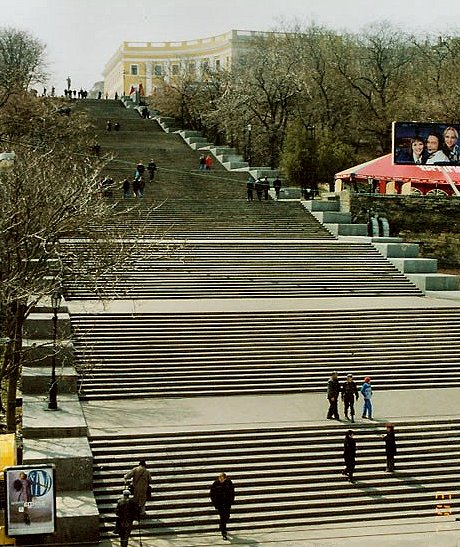
But I digress. I organised my visit to the Danube Delta meanwhile
and my hosts emphatically refused my offer of money as I left.
Passing through the city again five days later, on my way
back to Kiev, I felt I could not presume on their hospitality
again. Besides, I wanted the luxury of some privacy too and
finding myself dropped off near the station it seemed simplest
to go and pay $30 where I knew I could get some.
One week on, then, on my last day in Odessa, I woke again
in the four-star hotel. They had even given me the same room
as before, but its occupant was up earlier this time. The
door of that little office, from which the Americans came
and went, still stood ajar, I noticed, on my way down to breakfast.
Someone had printed off a long message in English and sellotaped
it to the mirror in the lift - it hadn't been there the
previous evening. My room was only on the second floor so
there wasn't much time to read it. The gist of it was
clear enough, however. The clients of www.anastasialadies.com
were hereby warned that they were being offered an inferior
product. It was time for them either to try www.anastasia.com
or, better still, to opt decisively and now for www.globaladies.com.
I suppose what I felt, apart from suddenly several years older,
were those journalistic antennae twitching back into life.
Downstairs the swarming of Americans continued, that black
ten gallon hat still greeted the world with its Howdee Partner,
tipped back at the same jaunty angle as before, only I found
I was looking at it differently now. Returning to my room
I shared the lift with one of them and finally had the wit
to ask why there were so many American guests staying.
‘We're
on a Romance Tour,' came the entirely unflustered reply.
‘Oh.'
‘Forty
guys. Five hundred Ukrainian ladies.'
‘I
see. Well. You're keeping busy then.'
‘Certainly
are.' The eyes levelled with me: they said And we're
not taking any shit from some stuck-up limey, either. The
doors of the lift opened and I went to my room as the lady
at her computer welcomed another visitor and, presumably,
another booking.
Two images, then, to end with. I had a couple of hours before
checking out so I went downstairs again and sat in the lobby
to watch. Soon afterwards a coach pulled up outside the hotel
and some of the forty guys escorted their selection of the
five hundred Ukrainian ladies out to it with lavish displays
of good ol' fashioned gallantry. Lest anyone detect an
element of the commercial in this arrangement. Balding types
in jeans and tennis shoes insisting on ladies first as they
stepped up into the coach.
I watched one of these couplets in particular settling themselves
in a seat towards the back. The Romantic Tourist, in late
middle age, put his arm around a girl young enough to be his
granddaughter, without touching her, just shielding her from
the sun with his hand as he let her take the seat by the window.
Lest anyone suspect an element of the carnal in this. Unfortunately,
as the girl sat back, it became apparent she had chosen a
seat the back-rest of which would not stay upright, so that
the young virgin in question found herself lying more or less
horizontal every time she tried to get comfortable. He who
was old enough to be her grandfather leant over her, concerned,
to see whether perhaps a man's more technical frame of
mind, whether this situation might not call for some American
know-how. The matter was still unresolved as the bus drove
off.
Second image: having seen enough, I walked up to the station
to buy my ticket back to Kiev. As I did so, in some perplexity
still at what I had just discovered, a bell tolled loudly
and so close-by it made me jump, awakening me to my surroundings.
I was right outside the church I'd stepped inside on
arrival a week ago. But you cannot step in the same church
twice anymore than you can in the same river. It was mid-morning
this time and the place was filled to overflowing.
Again I went inside - probably it was fuller than usual,
I guessed, in such anxious times. There were more women than
men, all in head-scarves, the men bare-headed. There was a
bowing in unison at the ringing of another bell, indoors,
from which the immobility of one old man stood out, leaning
his head against a pillar almost as if he was confessing to
it the sins of his youth. Outside the deeper bell which had
rung as I passed was gathering momentum now, ringing more
and more insistently, as if calling for still more people.
Calling for more people not to run after the Romantic Tourists
and their dollars. Calling for more endurance, more hope.
Children threaded their way excitably between the sombre adults
to light candles before another icon or altar.
I'd seen the use being made of religion by both of the
parties contending for power, so I could not view all this
now as naively as perhaps I had the previous Sunday. I had
walked with Reason Cast into Dejection meanwhile. and
hoped I saw things here more steadily as a result. But this
morning I needed some of that naivety more than ever. My antennae
may have been switched back on, ready for their return to
the fray, but I had never felt more uneasy about what was
happening here than I did now. When freedom presents itself,
not in the abstract, not in a speech or on TV, but this morning
in this actually existing street, when freedom presents itself
concretely as the choice between a priest's blessing
and globaladies.com,
or as blue vs. orange, to respond with some pacey little article
had never felt so much like collusion.
At the time I didn't really know what to do with this,
so I duly flew home and wrote my article. But Woolf's
conjuring with her characters' inner voices, Andrey's
silences and improvised dog-lead, Odessa, neglected city of
the Enlightenment - none of these ever quite went away. It's
taken all this time to recognise in them the best guides I
could possibly have had to the meaning of Ukraine's revolutionary
moment.
|
